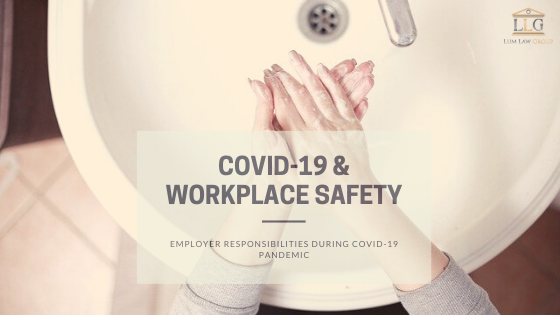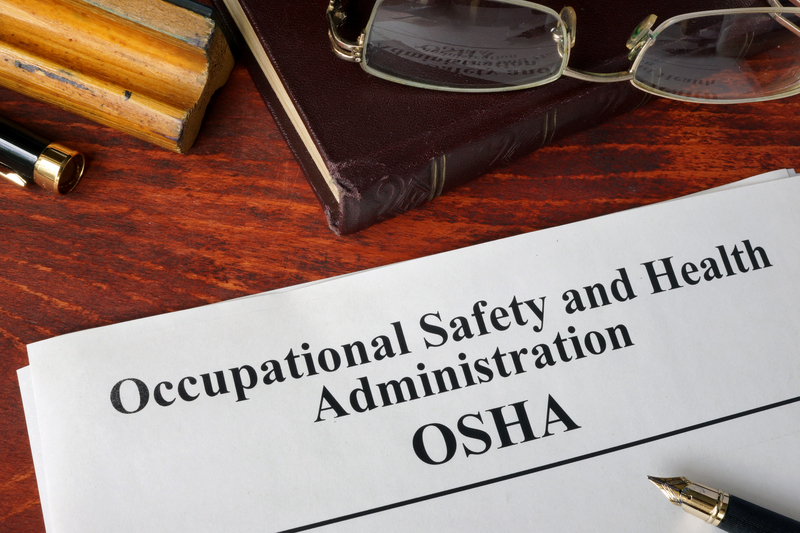COVID-19 and Employer Responsibilities for Workplace Safety
While some employers are subjected to the higher Aerosol Transmissible Diseases (ATD) Standard (California Code of Regulations, title 8, section 5199) in order to protect employees from airborne infectious diseases such as COVID-19, most employers are not. If you are not in healthcare, funeral, or drug-related industries, you will not be subjected to the ATD Occupational Safety and Health Administration (OSHA) standard. You can find the list of workplaces subject to the ATD standard here.
Please note that even if your business is not subject to the high standards of ATD, it is still required to follow the latest COVID-19 OSHA guidance for workplace safety. We all know we should wash our hands (yes, with soap), but this post will highlight some of the other key points small business owners and employers must follow in order to safely reopen during the pandemic.
1. Provide Washing Facilities
Every workplace should have “washing facilities”, or a place for workers to wash their hands. This could be a sink, or anywhere with water, soap (“washing agent”), and towels for drying.
See Title 8 sections 1527, 3366, 3457 and 8397.4
2. Disinfect and Clean Routinely
Perhaps your workplace already has cough and sneeze policies and a robust cleaning schedule, but in times of a pandemic, you should set higher standards for your workplace cleanliness. You can do so by:
- Reducing shared workplace areas
- If employees must share certain equipment or space, provide disinfectant sprays or wipes so that they can clean before and after each use
- Provide face coverings or encourage employees to use their own while in the workplace
- Provide disposable paper towels/tissues for employees
- Provide trash cans in convenient locations
- Provide hand-sanitizer for employee use
- Purchase EPA-approved disinfectants and cleaning supplies
- Re-train cleaning staff to follow cleaning supply manufacturer’s guidelines for usage
- Provide necessary Personal Protective Equipment (PPE), such as face masks, gloves, disinfectant wipes for employees to use freely
3. Establish Sick Leave Policies
Employers should establish sick leave policies for all employees for their safety. This does not just include allowing for sick leave, paying for sick leave, or establishing how an employee qualifies for sick leave, but also includes the reasons why an employee should not come to work. Here’s a list of what every employer should do during the coronavirus pandemic:
- Require sick employees to remain home.
- Send sick employees home if they exhibit any of the following symptoms:
- cough
- fever
- difficulty breathing
- chills
- muscle pain
- headache
- sore throat
- or recent loss of taste or smell.
- Prevent sick employees from returning to work until:
- they have been fever-free for at least three days without taking fever reducer medication and
- they have been symptom-free for at least ten days since their first symptoms appeared
- Provide employees with paid sick leave if required (Families First Coronavirus Response Act)
If one of your employees is tested positive for COVID-19, be sure to keep the information private per the Americans with Disabilities Act (ADA).
4. Create a Workplace Injury and Illness Protection Program (IIPP)
California employers are required to create and set up a program to protect employees from injury and illness, which includes infectious diseases such as COVID-19. As an employer, you must follow the following steps:
- Determine if your workplace could be a COVID-19 hazard. For example, if there has been exposure to someone who has tested positive for the virus, or if it’s a high-traffic area, etc.
- Evaluate the risk of exposure to COVID-19
- Prevent infection in the place by:
- creating physical barriers to control the spread of virus, such as the plastic screens at checkout counters,
- social distancing,
- providing appropriate personal protective equipment (PPE), hygiene, and cleaning supplies.
- If concerned, practice infection control measures provided by the Centers for Disease Control and Prevention (CDC):
See Title 8 section 3203
5. Encourage Social Distancing
By now, we are all familiar with the term: “social distancing” where we are encouraged to stay several feet away from any other person at all times. As an employer, this could mean several things for you:
- Sending your employees home to work remotely
- Cancelling all face-to-face meetings and using a video conferencing or teleconferencing service instead
- Rearranging office furniture to distance desks
- Break up the open space with new walls
- Placing tape on the floor to show how far six-feet of social distancing should look like
- Alternating employee schedule to reduce in-office traffic
6. Provide Employee Training
As an employer, you should train your employees so that they are aware of how to protect themselves from COVID-19 both in the workplace and outside of it. By teaching your employees how to protect themselves, you will ultimately protect all of your workforce, you, and your customers.
Be sure all your employees are aware of the following:
- COVID-19 symptoms and when to stay home
- COVID-19 testing sites and options
- How COVID-19 is spread and how to prevent its spread
- Advise employees of the dangers of non-essential travel
For additional guidance on how to provide a safe workplace for your employees during this COVID-19 pandemic, please visit the California website. Your specific industry might require additional steps not listed in this article. The website is also a good resource for downloadable documents to print and post for your employees’ education.
If you have questions regarding employer liability, or even a wishlist of topics we could cover, please comment below or send us a message.


